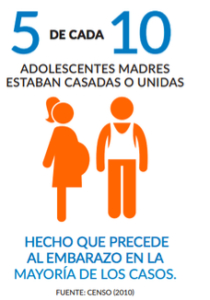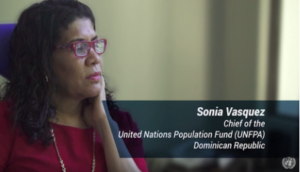Dominican Republic and Sexual Education
Sabrina B. Espinal T
Aisha- Sidibe
City College of New York
December 4, 2018
Abstract
According to UNAIDS Regional Director for Latin America, “Childhood and adolescence are important periods for development of people and their country, and for this reason it is necessary to provide quality education that includes comprehensive education on sexual both as human right, as well as one that contributes to present and future quality of life”. Thus, I believe as well that teenagers in the Dominican Republic should have the opportunity and access to have a well-informed program or class in their school institutions. My plan is to introduce age-appropriate, well informed and equipped resources to school institutions such as programs or classes in the Dominican Republic. I strongly believe that the Educational System in the Dominican Republic is lacking, and it is in need of a program that offers a realistic and reliable health and reproductive education to the youth. Understanding that because of economic, social and cultural matters, many young people in the Dominican Republic experience a lack of awareness of the consequences of having unsafe and unprepared intimate relations, that why it is important to adequately address young people.
 Sexual Education in the Dominican Republic
Sexual Education in the Dominican Republic
Despite the wide recognition of the need for sexuality education in the Dominican Republic, little has been done to help address this situation. The availability of guidance and program resources from the government is too little and not effective and unreliable. Experts indicated that the Dominican teenage pregnancy is alarming. According to the San Diego Union Tribune Newspaper, “the incidence of teenage pregnancy in the Dominican Republic is between 25 and 30 percent.” Many studies reveal that around 105 out of 1,000 girls became pregnant between 15-19 years, in 2013. In 2012, the Dominican government launched an initiative to try to reduce the high rate of adolescent motherhood, by providing condoms to the youth. Their problem? Not educating adolescents about the ways in which they can protect themselves from not just unexpected pregnancies, but also their mental, sexual and physical health. According to the National Human Development report of 2017, the Dominican Republic has 34% of teenage pregnancies, which is the higher rate compared to the average for Latin America and the Caribbean countries. Abortion in the Dominican Republic is strictly illegal, and sex remains a taboo, teens are hardly taught about it. Being said that, the country has double the world’s average and triple in the United States of teenage pregnancy rates.
In the Dominican Republic, family, social and cultural perception of sexuality strongly influences the way sexual education is talked about. Because education starts at home, parents should educate their kids about sexual education since the kid is 10-12 years which is where around adolescence begins and puberty arrives. Adolescence is the stage in which the person starts to perceive sexuality and it is the period in which the kid starts to explore it body and can quickly understand about such topic because of curiosity notions. Kids in the Dominican Republic are simply told and advised to not have sex, but rarely taught about it, for the most part, such behaviors are associated with lower economic and education opportunities. However, why is the Dominican parenting and social structure forbidding the discussion of such a particular topic? What is the role that culture plays in the provision and assimilation of sexual education among the Dominican region? Many may ask.
Sexual education is a key component to address the high need for sexual and reproductive health information and services among the youth. Many parents in the Dominican Republic say that kids are too young to be focusing and taught about sexuality and it is better to maintain them abstinent. However, the Dominican Republic has the highest rate of teenage pregnancy of Latin America. For the most part, Latixs parents believe that reinforcing terror, guilt and avoidance of the topic is the best way to teach their kids about contraceptives, instead of having real and useful talks. Explaining the importance of addressing sexual and reproductive health to young and adults will guide them to make advised and prepared decisions for their present and future life choices.
Culture plays an important role in the Dominican ability to assimilate to sexual education,  mostly because of religious beliefs. Catholicism is practiced by more than 57% of the Dominican society, and systematics and conservative believe among the Latinx culture is pretty strong, being the government strongly influenced by the catholic church’s beliefs. According to an article published by Boston University of Theology, “History shows that Spaniards introduced… and brought with them a patriarchal religious view towards the body and sexuality of the women”. The belief of “kids” being too young to teach them about sexual and reproductive health is mistaken, if so, what is the appropriate age to do so? Children see everything on the internet, but unfortunately in their school and houses, such topic is little or never touched.About 70% of Latin American students do not have the tools nor comprehensive access to sexual education. Focusing on learning about their bodies and how to protect their mental and physical well-being would avoid and reduce sexually transmitted diseases (STDs), unexpected pregnancies, clandestine abortions, and the belief of sexuality as a taboo.
mostly because of religious beliefs. Catholicism is practiced by more than 57% of the Dominican society, and systematics and conservative believe among the Latinx culture is pretty strong, being the government strongly influenced by the catholic church’s beliefs. According to an article published by Boston University of Theology, “History shows that Spaniards introduced… and brought with them a patriarchal religious view towards the body and sexuality of the women”. The belief of “kids” being too young to teach them about sexual and reproductive health is mistaken, if so, what is the appropriate age to do so? Children see everything on the internet, but unfortunately in their school and houses, such topic is little or never touched.About 70% of Latin American students do not have the tools nor comprehensive access to sexual education. Focusing on learning about their bodies and how to protect their mental and physical well-being would avoid and reduce sexually transmitted diseases (STDs), unexpected pregnancies, clandestine abortions, and the belief of sexuality as a taboo.
Introducing an age-appropriate, youth friendly, real and reliable school program about sexual education is a way to have adolescents “start safe and stay safe,” because comprehensive sex ed encourages abstinence, not ignorance. Moreover, because of social pressure and cultural expectancies, many poor young girls in the Dominican Republic get discouraged and cannot imagine a successful future. Consequently, many girls stop attending to school and choose for motherhood as a way to escape their circumstances without understanding the effect of such actions. According to the 2010 census, five out of ten teenage mothers were or got married when they got pregnant; showing once again, the outcome of not educating our children and not encouraging them to stay safe and stay in school.
Even though, abortion is strictly illegal in the Dominican Republic, it often happens in neighborhoods where poor girls and boys never got the right informatio n and resources, therefore they put their lives at risks when they opt to interrupt their pregnancy. Roughly 200 women die every year due to pregnancy related causes. According to Sonia Vargas, Chief of United Nation Population Fund (UNPFA) in the Dominican Republic, “a girl coming from a poor household is 7x more likely to get pregnant and keep the cycle of poverty.” Education is a key component to our society; therefore, we have to provide our kids with comprehensive and reliable information, due to that “a teenager with no or very little education is 4x more likely to get pregnant.”
n and resources, therefore they put their lives at risks when they opt to interrupt their pregnancy. Roughly 200 women die every year due to pregnancy related causes. According to Sonia Vargas, Chief of United Nation Population Fund (UNPFA) in the Dominican Republic, “a girl coming from a poor household is 7x more likely to get pregnant and keep the cycle of poverty.” Education is a key component to our society; therefore, we have to provide our kids with comprehensive and reliable information, due to that “a teenager with no or very little education is 4x more likely to get pregnant.”
By introducing a plan that includes a complete, cultural approachable, reliable class curriculum about sexual and reproductive education in the Dominican Republic will help on building responsible and well aware citizens. Having a school curriculum with students from 10 to 19 years and instruct and provide them the opportunity to explore and learn about their body, decision making, communication, values and many aspects of sexuality; this approach to the youth in the Dominican Republic would make sure to know deliver them information about their rights, health and sexuality. In the same way, it is important to teach adolescents that these cultural and social beliefs come from hundreds of years, back to colonization, and that this believes enforce values that are creating a generation lacking basic information, forming gendered oppression. Offering technical instruction, emotional skills as well as professional preparation, would strengthen the skills of this young women of 16-20 years of age, to prevent premature decisions regarding to motherhood and will improve expectations on their future, such as:
- Provide information to students that enriches their needs and concerns.
- Provide counseling services; private and confidential advisory, safe for youth.
- Address cultural and social norms and values. Provide parent, teachers and people who work with youth adequate training. Offer free services to maintain an adequate supply of contraceptive methods.
- Provide technology reached information; such as books, websites, catalogs and other digital media sources as a way to deliver information to those with little evidence and resources.
Reducing risky behaviors and increasing health-seeking practice among adolescents in the Dominican Republic, would strengthen a change in the population. Those who deliver and interact with the students must be capable and trained to deal with such sensitive topic, as well as be youth-friendly, because the lack of sexual and health education in the country is an issue that has to be addressed properly.
Reference
“Experts call the Dominican teen pregnancy alarming”. San Diego Union Tribune: Hoy. September 26. http://www.sandiegouniontribune.com/hoy-san-diego
Escobar, Emma and Roffe, Jessica. “Theology and Sex Education with Hispanics/ Latinos”. Boston University of Theology. http://www.bu.edu/shaw/theology-and-sex-education-with-hispanicslatinos/
“70% of students in Latin America do not have access to comprehensive access to sexual education”. Plataforma Regional: América Latina y el Caribe. April 03. https://plataformalac.org/en/2017/04/70-of-students-in-latin-america-do-not-have-comprehensive-access-to-sexual-education/
Sanchez, Erica and Rendo, Maria. “Teen Pregnancies Remain Stubbornly High in Latin America: Report”. Global Citizen: Girls&Women. May 04, 2018.
https://www.globalcitizen.org/en/content/teen-pregnancies-in-latin-america/
Nozicka, Luke. “Lesson Unplanned: Teenage Pregnancy in the Dominican Republic”. Pulitzer Center: Story. June 15, 2015. https://pulitzercenter.org/reporting/lesson-unplanned-teenage-pregnancy-dominican-republic#slideshow-0
Every listed source above, helped me obtain statistics as well as really useful information, used in this researched proposal. In the same way, provided me with unknown data that assisted me in my plan decisions, especially in my “Researched Methodology” and at the same way they helped me acknowledge that not only is sexual education important for adolescents to know about their bodies, but also to help them become well-educated and responsible human beings.
Audience: Adolescents, Sexual Health, Latin Americans and Caribbean, Reproductive Health.



